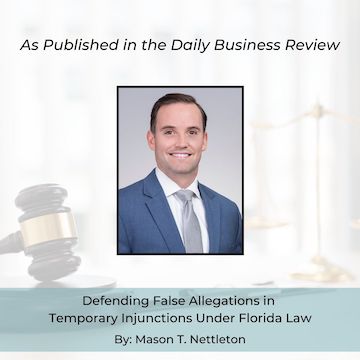By: Mason T. Nettleton
As published in the Daily Business Review

After a widely publicized defamation trial garnered the nation’s attention on the topic of domestic violence allegations during summer 2022, the most common question I received from clients during the trial is what can be done when an individual makes demonstrably and verifiably false allegations in seeking an injunction for protection against domestic violence against another?
Aside from the obvious of challenging the legitimacy of and seeking dismissal of the petition for injunction based on the underlying false allegations, the Florida Supreme Court now recognizes that in certain circumstances, Section 57.105, Florida Statutes can provide an aggrieved respondent an award of attorney fees and costs incurred to defend against the allegations.
It comes as a surprise to most Floridians when I tell them temporary injunctions for protection against domestic violence can be entered on behalf of a petitioner based entirely on the unilateral (i.e., one-sided) allegations made by the petitioner. This occurs prior to any hearing in a court where the respondent may be heard, for up to a 15-day period. A temporary injunction can be granted without the accused either being advised of the allegations against them, or being permitted to cross-examine witnesses regarding the allegations made the temporary injunction.
Serious legal ramifications flow to a respondent from the granting of a temporary injunction during this temporary period. First, the respondent is served personally with the temporary restraining order by a local sheriff. Florida law requires any individual whom a Section 784 injunction has been entered against to not possess a firearm or ammunition, and violation of a temporary injunction may be enforced through a civil or criminal contempt proceeding or prosecuted as a criminal violation.
Temporary injunctions can also include a public record of the injunction that can affect a person’s employment and freedom to travel while the injunction remains in place. At least one, if not all these legal consequences are triggered simply when a respondent is served with a temporary restraining order, which is why adequate legal representation to defend against the temporary injunction should be retained immediately by the respondent.
Unfortunately, despite the potential consequences faced by a respondent served with a temporary injunction for protection against domestic violence, a majority of respondents are not represented by an attorney when defending against a temporary injunction in Florida. Florida’s Fourth District Court of Appeal recently warned trial judges that expediency during injunction hearings cannot overwhelm a trial judge’s obligation to ensure a litigant fully understands the consequences that flow from injunctions for protection, even those entered on a temporary basis. See. e.g., Burns v. Bockorick, 220 So. 3d 438 (Fla. 4th DCA 2017).
Florida law has recently shined some light on available relief for a respondent in such a scenario. Section 57.105, Florida Statutes permits, upon the court’s initiative or motion of any party, the court may award a reasonable attorney fee … to be paid to the prevailing party in equal amounts by the losing party and the losing party’s attorney on any claim or defense at any time during a civil proceeding or action in which the court finds that the losing party or losing party’s attorney knew or should have known that a claim or defense when initially presented to the court or at any time before trial was not supported by the material facts necessary to establish the claim or defense.
The statute’s plain language has been interpreted to make clear it supplies a way to sanction a party and its attorney in civil actions for baseless claims or defenses. The Florida Supreme Court has specifically found that Section 57.105, Florida Statutes applies to injunctions for protection against domestic violence, so long as the 21-day notice requirement embedded in the statute is complied with by the moving party. See, Lopez v. Hall, 233 So. 3d 451, 454 (Fla. 2018).
If you are representing a respondent who has been served with a temporary injunction for domestic violence, in addition to defending against the underlying injunction itself, after carefully evaluating the allegations, consider adding to your defense arsenal the available remedies contained in Section 57.105, Florida Statutes.
Mason T. Nettleton is a shareholder in Fowler White’s commercial litigation, insurance, and family law practice groups. He received his J.D., cum laude, from the University of Miami School of Law.
Reprinted with permission from the August 8, 2022 online edition of the Daily Business Review© 2022 ALM Global Properties, LLC. All rights reserved. Further duplication without permission is prohibited, contact 877-256-2472 or reprints@alm.com.